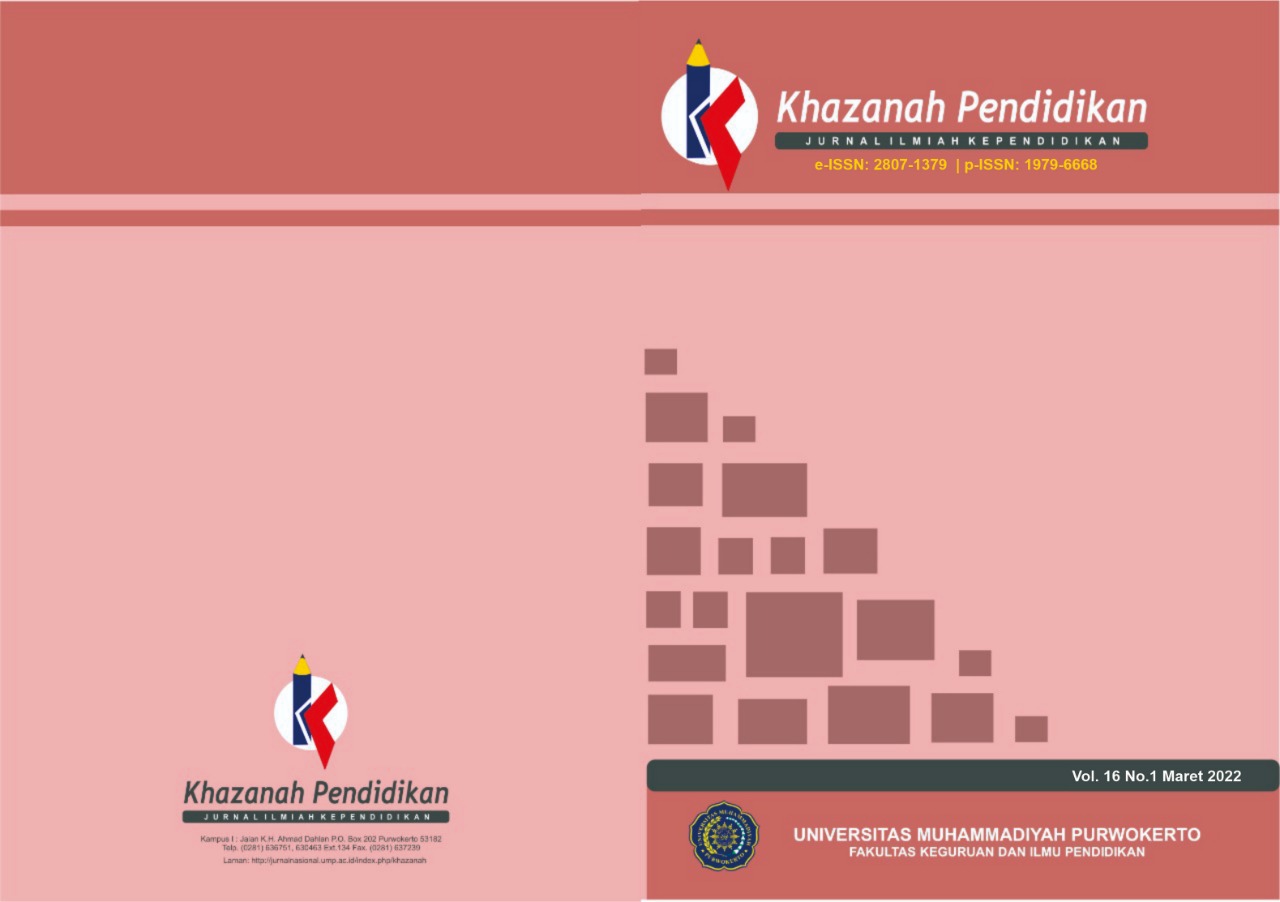PERAN GURU SEBAGAI FASILITATOR PEMBELAJARAN DARING PADA PANDEMI COVID-19
DOI:
https://doi.org/10.30595/jkp.v16i1.12760Keywords:
ICT, Learning Media, Case StudiesAbstract
This study aims to determine the role of online learning facilitator teachers during the pandemic at SDN Cimande 01 using a qualitative approach with the case study method. Data collection techniques were carried out through observation, questionnaires, interviews and documentation. The research respondents consisted of 1 teacher, 23 parents and 23 grade VI elementary school students. The data analysis procedure uses the Miles and Huberman model, namely reduction, data presentation, and drawing conclusions. Validity check using source and technique triangulation. The results showed that the teacher's role as a facilitator of online learning during the pandemic was carried out through the use of information and communication technology (ICT) through WhatsApp, Google Meet and Google Classroom. Learning videos are used as learning media. The learning methods used in online learning are question and answer, discussion and assignments. The inhibitory factors for teachers as facilitators are students, who are associated with the lack of availability of their smartphones, adding an internet quota while learning, and an unstable internet network.References
Anugrahana, A. (2020). Hambatan , Solusi dan Harapan : Pembelajaran Daring Selama Masa Pandemi Covid-19 Oleh Guru Sekolah Dasar. Scholaria: Jurnal Pendidikan Dan Kebudayaan, 10(3), 282–289.
Astini, N. K. S. (2020). Pemanfaatan Teknologi Informasi dalam Pembelajaran Tingkat Sekolah Dasar pada Masa Pandemi Covid-19. Jurnal Lembaga Penjaminan Mutu STKIP Agama Hindu Amlapura, 11(2), 13–25.
Heggart, K. R., & Yoo, J. (2018). Getting the most from google classroom: A pedagogical framework for tertiary educators. Australian Journal of Teacher Education, 43(3), 140–153. https://doi.org/10.14221/ajte.2018v43n3.9
Mastur, M., Afifulloh, M., & Dina, L. N. A. B. (2020). Upaya Guru Dalam Melaksanakan Pembelajaran Daring Pada Masa Pandemi Covid-19. JPMI : Jurnal Pendidikan Madrasah Ibtidaiyah, 2(3), 72–81.
Miles, M. B., & Huberman, A. M. (2014). Analisis data kualitatif (pp. 52–54). SAGE Publications, Inc.
Oviyanti, F. (2013). Tantangan Pengembangan Pendidikan Keguruan di Era Global. Jurnal Pendidikan, 7(2), 270.
Pohan, A. E. (2020). Konsep Pembelajaran Daring Berbasis Pendekatan Ilmiah (1st ed.). CV. Sarnu Untung.
Purnawanto, A. T. (2020). Problematika Pembelajaran Daring di Masa Pandemi Covid-19. Jurnal Paedagogy, 7(4), 281. https://doi.org/10.33394/jp.v7i4.2941
Purwanto, A., Pramono, R., Asbari, M., Santoso, P. B., Wijayanti, L. M., Choi, C. H., & Putri, R. S. (2020). Studi Eksploratif Dampak Pandemi COVID-19 Terhadap Proses Pembelajaran Online di Sekolah Dasar. EduPsyCouns: Journal of Education, Psychology and Counselin, 2(1), 1–12. https://ummaspul.e-journal.id/Edupsycouns/article/view/397
Riyanto, Y. (2014). Paradigma Baru Pembelajaran (Wahyu (ed.); 4th ed.). Kencana.
Sanjaya, W. (2013). Strategi Pembelajaran Berorientasi Standar Proses Pendidikan (Pertama). Prenada Media Group.
Sanjaya, W., & Budimanjaya, A. (2017). Paradigma Baru Mengajar. Kencana.
Sudrajat, J. (2020). Kompetensi Guru di Masa Pandemi Covid-19. Jurnal Riset Ekonomi Dan Bisnis, 13(1), 100–110.
Sutisna, D., & Widodo, A. (2020). Peran Kompetensi Guru Sekolah Dasar Dalam Meningkatkan Efektivitas Pembelajaran Daring.
Jurnal Bahan Manajemen Pendidikan, 9(2), 58–64.
Syarifudin, A. S. (2020). Impelementasi Pembelajaran Daring Untuk Meningkatkan Mutu Pendidikan Sebagai Dampak Diterapkannya Social Distancing. Jurnal Pendidikan Bahasa Dan Sastra Indonesia Metalingua, 5(1), 31–34. https://doi.org/10.21107/metalingua.v5i1.7072
WHO. (2019). Apa itu COVID-19? Covid19.Go.Id. https://covid19.go.id/tanya-jawab?search=pandemi+covid
Downloads
Published
Issue
Section
License
Authors who publish with this journal agree to the following terms:
Authors retain copyright and grant the journal right of first publication with the work simultaneously licensed under a Creative Commons Attribution License that allows others to share the work with an acknowledgement of the work's authorship and initial publication in this journal.
Authors are able to enter into separate, additional contractual arrangements for the non-exclusive distribution of the journal's published version of the work (e.g., post it to an institutional repository or publish it in a book), with an acknowledgement of its initial publication in this journal.
Authors are permitted and encouraged to post their work online (e.g., in institutional repositories or on their website) prior to and during the submission process, as it can lead to productive exchanges, as well as earlier and greater citation of published work (See The Effect of Open Access).

Khazanah Pendidikan is licensed under a Creative Commons Attribution 4.0 International License.


